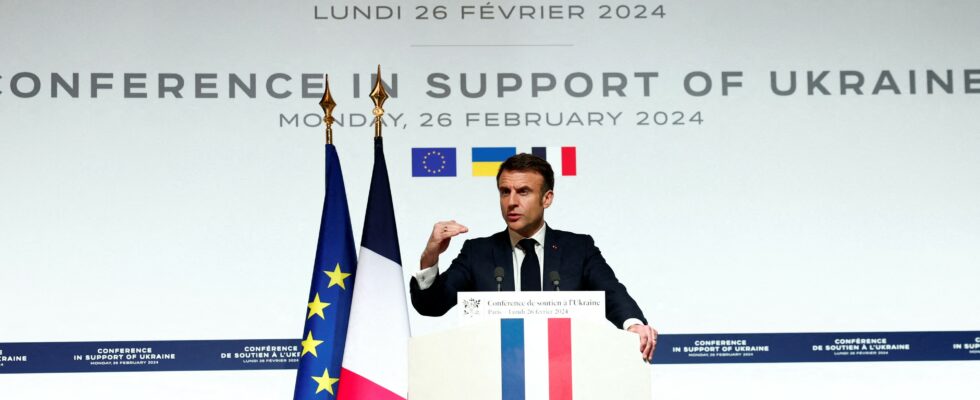Berlin, London and other European allies of Kiev on Tuesday rejected the comments of French President Emmanuel Macron, believing the day before that the sending of Western troops to Ukraine could not “be excluded”. The Kremlin, for its part, judged that it was “absolutely not in the interest of these countries” to send soldiers to Ukraine. The mere fact of evoking this possibility constituted “a very important new element” in the conflict, added the spokesperson for the Russian presidency, Dmitri Peskov, while noting that there was “no consensus” on the subject among Westerners.
“Strategic ambiguity”
Asked about the risk of a direct conflict between NATO and Russia in the event of a military presence in Ukraine, Dmitry Peskov replied that “in this case, we should not talk about probability, but about inevitability.” Monday in Paris, Emmanuel Macron recognized that there was “no consensus today to send ground troops in an official, assumed and endorsed manner.” “But dynamically, nothing must be excluded. We will do everything necessary to ensure that Russia cannot win this war,” he added, saying he was “assuming” a “strategic ambiguity”.
“Many people who say ‘Never, never’ today were the same people who said ‘Never tanks, never planes, never long-range missiles’ two years ago,” he also stressed. Emmanuel Macron was speaking at the end of an international conference in support of Ukraine, hastily organized in France in the presence of twenty-seven other countries, at a critical moment for kyiv, awaiting the Western weapons necessary to its survival.
“No large-scale deployment”
German Chancellor Olaf Scholz said on Tuesday that “no soldier” would be sent to Ukraine by European or NATO countries: “What was decided between us from the beginning continues to be valid for the future “, namely that “there will be no troops on the ground, no soldiers sent either by European states or by NATO states on Ukrainian soil.” His Defense Minister, Oscar Pistorius, mentioned “a proposal for reflection from President Macron that apparently no one followed” on Monday.
On the United Kingdom side, a spokesperson for British Prime Minister Rishi Sunak specified that “a small number” of people sent by London were already there “to support the Ukrainian armed forces, particularly in terms of medical training”, adding: “We do not plan a large-scale deployment.” Madrid “does not agree” with the idea of ”deploying European troops in Ukraine”, according to the spokesperson for the Spanish executive, Pilar Alegria.
Warsaw and Prague also rejected the possibility outlined by Paris. “We are not considering sending our troops to Ukraine and we have a common position on this point” with the Czech Republic, Polish Prime Minister Donald Tusk declared Tuesday during a press conference with his Czech counterpart Petr Fiala . Ulf Kristersson, Prime Minister of Sweden, which will very soon become the 32nd member of NATO, argued that “there is no demand” on the Ukrainian side for ground troops. So “the question is not current”, he insisted, without however excluding this possibility in the future.
“No plans” from NATO
Budapest, the only capital among the Twenty-Seven to have maintained close ties with Moscow after the launch of the invasion of Ukraine two years ago and which for some time blocked new European aid to Kiev, has unsurprisingly displayed his opposition to “sending weapons or soldiers to Ukraine” because “we must end the war, and not deepen and widen it”, according to his head of diplomacy, Peter Szijjarto. NATO has also ruled out any sending of troops to the theater of operations. “NATO and Allies are providing unprecedented military aid to Ukraine. We have done so since 2014 and shifted into high gear after the full-scale Russian invasion. But there are no plans of NATO combat troops on the ground in Ukraine,” an Alliance official told AFP on Tuesday.
Since receiving Ukrainian President Volodymyr Zelensky in mid-February at the Elysée to sign a bilateral security agreement, Emmanuel Macron has painted a very dark picture of Vladimir Putin’s intentions and has tried to position himself at the forefront of support brought to Kiev. Within the French political class, the possibility of sending troops to Ukraine has raised an outcry among opposition groups, from the radical left to the far right, including the socialists and the right.
